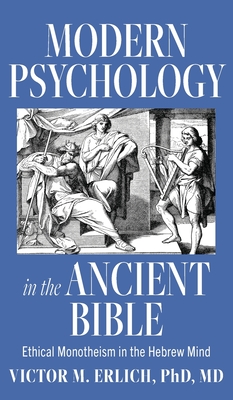Modern Psychology in the Ancient Bible: Ethical Monotheism in the Hebrew Mind

Modern Psychology in the Ancient Bible: Ethical Monotheism in the Hebrew Mind
The ancient Hebrews particularly needed a psychology that could explain the differences between their beliefs and those of their neighbors. Worshippers of the god Moloch favored child sacrifice, but the Hebrews did not, at least not most of the time. At other times the Hebrews were ambivalent about idolatry, as were those standing before Elijah on Mount Carmel. Too often the stiff-necked Hebrews were drawn into the very depths of irrational idolatry, provoking poetic prophecies of rebuke.
The Hebrews slowly realized that they needed a psychological explanation for their erratic embrace of ethical monotheism, as well as an explanation for the behavior of their irrational neighbors, whom they often admired. What leads one to choose ethical monotheism rather than the rites of Moloch, the fire god?
To answer this question the Hebrew Bible presents a large cast of characters with overactive drives and inadequate reason, from irrational Adam and Eve, fratricidal Cain, and drunk Noah, on through a series of fabled-but-troubled heroes of the Bible, including unpredictable Samson, psychotic Saul, manic David, and Solomon, whom the captivating Queen of Sheba seduced from his wisdom.
This exploration continued into the Bible's literary work, which includes David's Psalms, Hosea's salacious prophecies, Solomon's erotic Song of Songs, and Jeremiah's elegiac Lamentations, all of which confront the intra-psychic conflicts described by modern psychology. From beginning to end, the Hebrew Bible follows a psychological thread as it inquires into the kind of mind that might value monotheism.
PRP: 275.42 Lei
Acesta este Prețul Recomandat de Producător. Prețul de vânzare al produsului este afișat mai jos.
247.88Lei
247.88Lei
275.42 LeiLivrare in 2-4 saptamani
Descrierea produsului
The ancient Hebrews particularly needed a psychology that could explain the differences between their beliefs and those of their neighbors. Worshippers of the god Moloch favored child sacrifice, but the Hebrews did not, at least not most of the time. At other times the Hebrews were ambivalent about idolatry, as were those standing before Elijah on Mount Carmel. Too often the stiff-necked Hebrews were drawn into the very depths of irrational idolatry, provoking poetic prophecies of rebuke.
The Hebrews slowly realized that they needed a psychological explanation for their erratic embrace of ethical monotheism, as well as an explanation for the behavior of their irrational neighbors, whom they often admired. What leads one to choose ethical monotheism rather than the rites of Moloch, the fire god?
To answer this question the Hebrew Bible presents a large cast of characters with overactive drives and inadequate reason, from irrational Adam and Eve, fratricidal Cain, and drunk Noah, on through a series of fabled-but-troubled heroes of the Bible, including unpredictable Samson, psychotic Saul, manic David, and Solomon, whom the captivating Queen of Sheba seduced from his wisdom.
This exploration continued into the Bible's literary work, which includes David's Psalms, Hosea's salacious prophecies, Solomon's erotic Song of Songs, and Jeremiah's elegiac Lamentations, all of which confront the intra-psychic conflicts described by modern psychology. From beginning to end, the Hebrew Bible follows a psychological thread as it inquires into the kind of mind that might value monotheism.
Detaliile produsului










